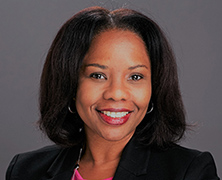The Magic of Us
As women, we are constantly asked to choose one identity and to stick with that. I am an Afro-Latina, and growing up I did a fair amount of code switching to “fit in.” In my college days, if I wanted to advocate for Black rights, the perspectives of women were secondary to the cause. If I advocated for women’s rights, issues around race were made secondary, and I was asked to focus on women only. I couldn’t speak to the Latina experience, because I didn’t speak Spanish well and was seen as Black, not Panamanian. I didn’t have the words to describe my experience or how I walked through world until I came across the term intersectionality in law school.
The term intersectionality was coined in 1989, by Professor Kimberle Crenshaw, to describe how race, class, gender, and other individual characteristics intersect and overlap. It speaks to the fact that a person does not have to choose one identity over another. In fact, it is the intersection of those identities that makes each of us who we are—the magic of us.
What I have learned in my experiences, is that when we leave parts of ourselves behind to fit into a culture, we are leaving our magic behind, and that this culture we are so desperately trying to fit into is the lesser for it. If we do not speak about the barriers and inequities we face at the intersections of our identities, we lose the opportunity to make things better for our communities.
This silence can also have real implications on our health and safety. An example of this can be seen throughout the pandemic. In addition to being fearful that my husband and children would be hospitalized with COVID, as a Black woman, I was terrified of being hospitalized with COVID because I would have no one with me to advocate for me.
There is a history within the field of medicine of overestimating the pain tolerance of Black people. This often leads to us being misdiagnosed and without proper medical care. There is also a history of the health industry not believing women when they share their symptoms. You combine those prejudices and a Black woman’s life is at risk when she enters a hospital. For this reason, we must embrace all our identities and advocate for ourselves and our communities.
By telling the world who we are as leaders—the pieces that make us whole—we create space for our colleagues and teams to do the same. We also create a community that stands together for one another to make things better for all of us. It is not always easy to share our truths—it is an act of courage to make yourself vulnerable. Thus, it is important that we stand together in allyship, that we recognize the privilege we each have in different circumstances, and that we use our voices to amplify the experiences of others.







